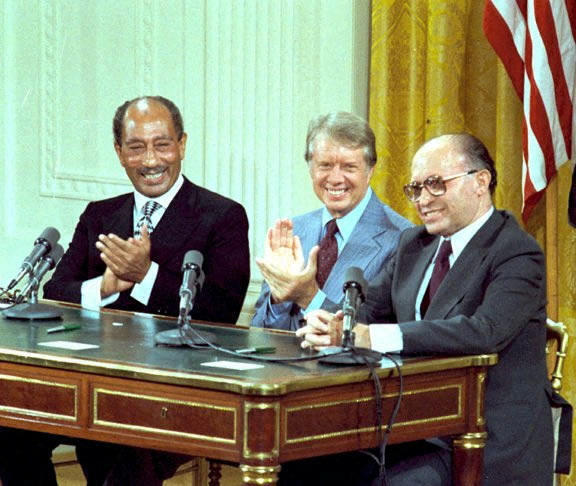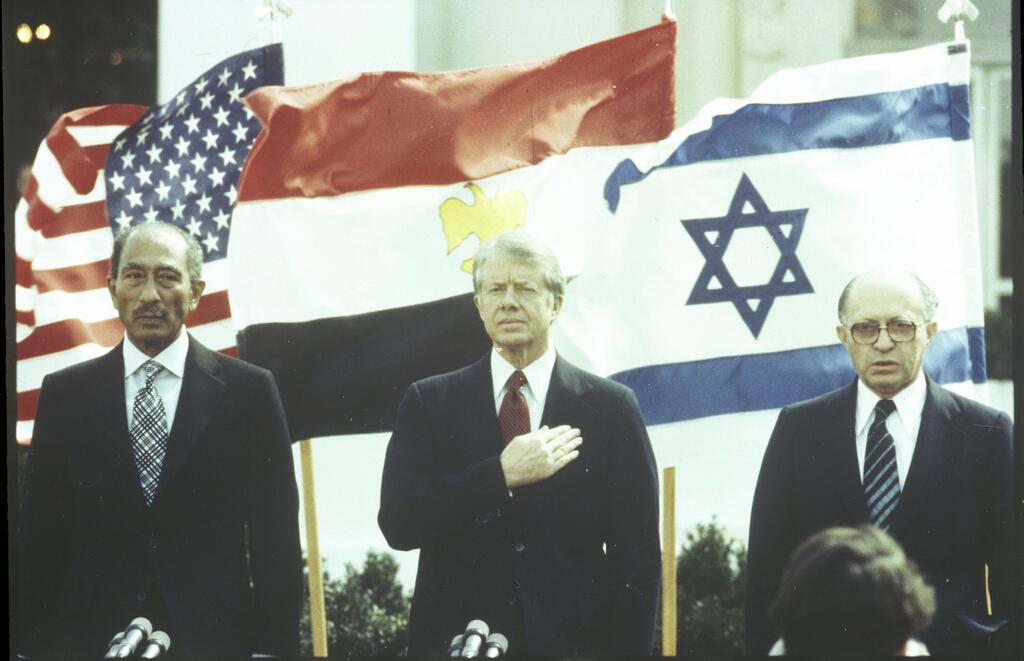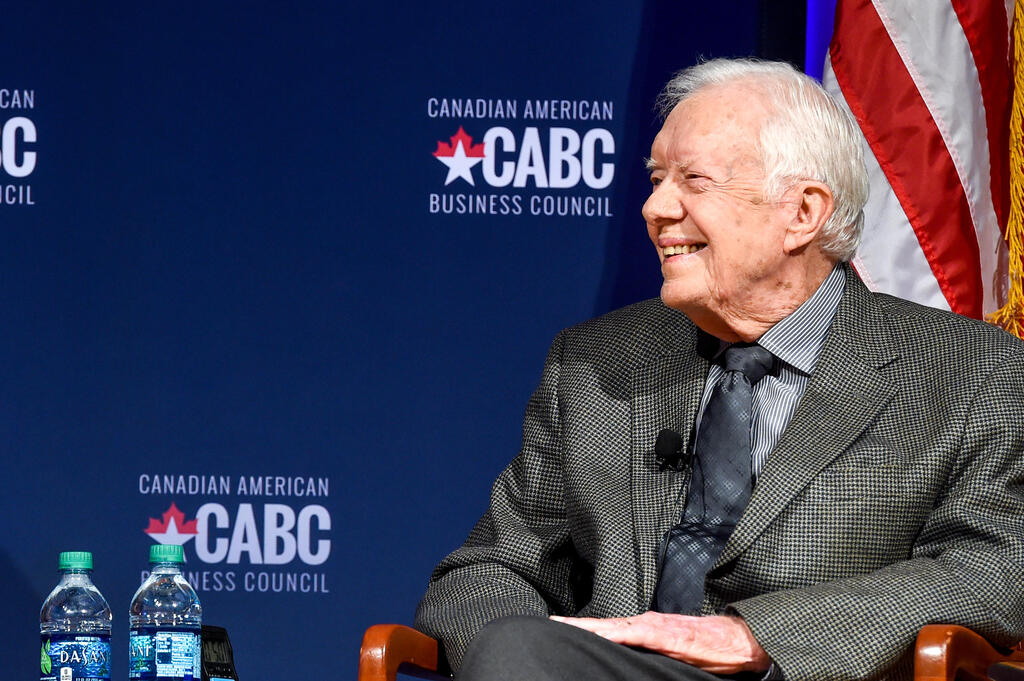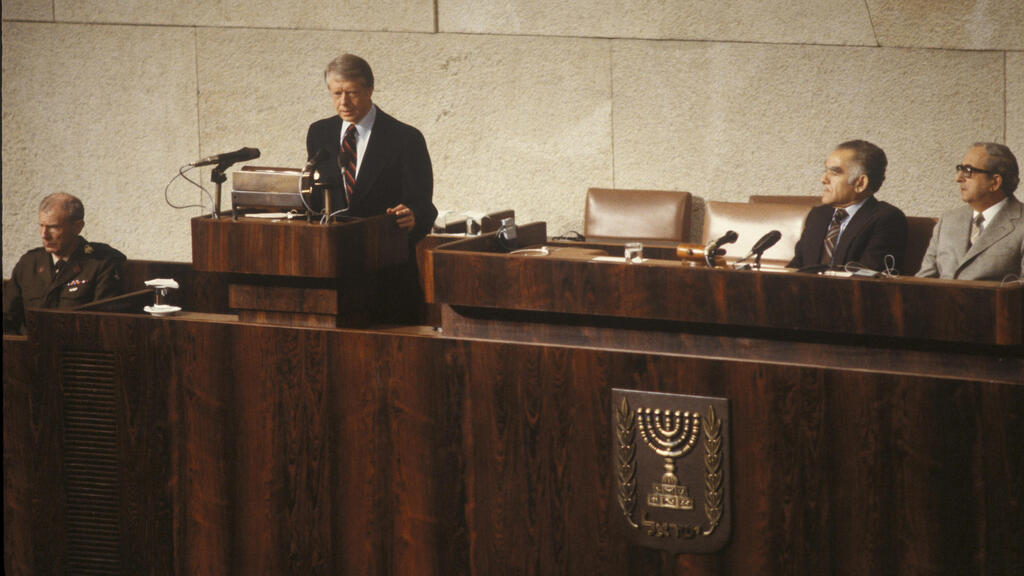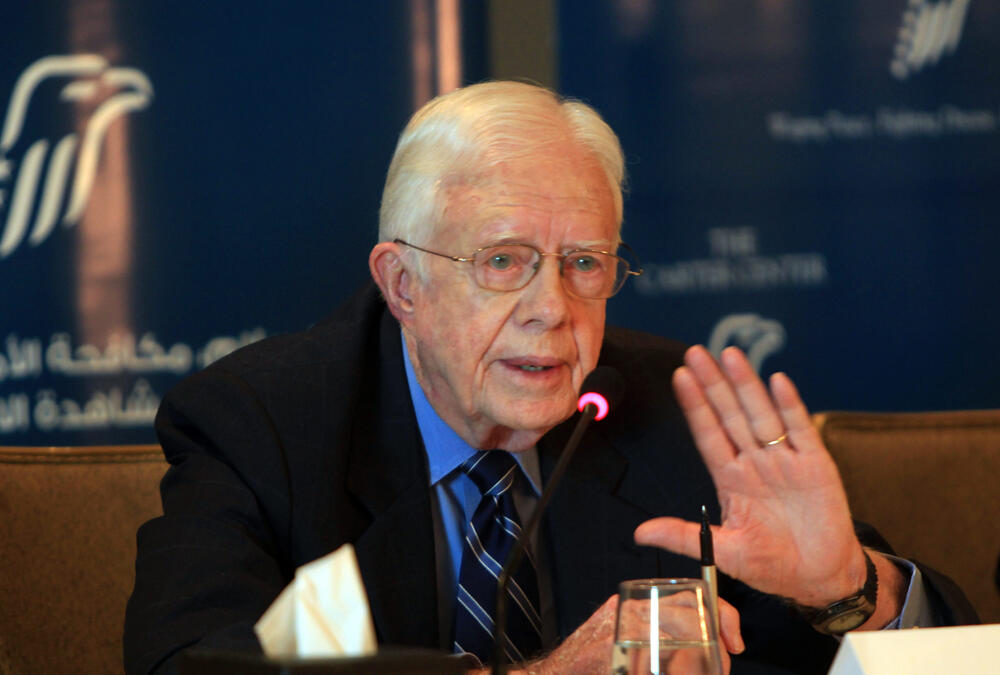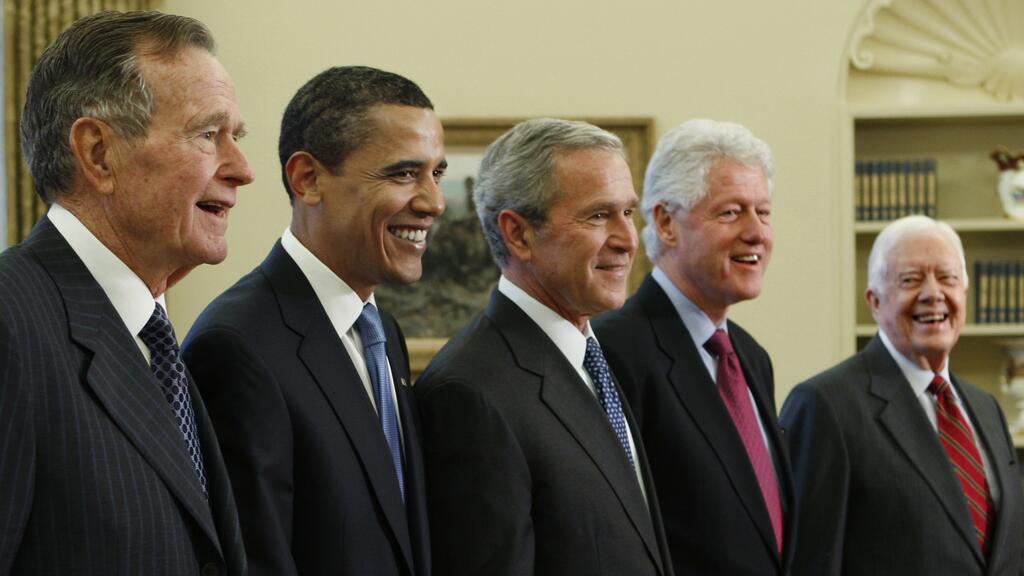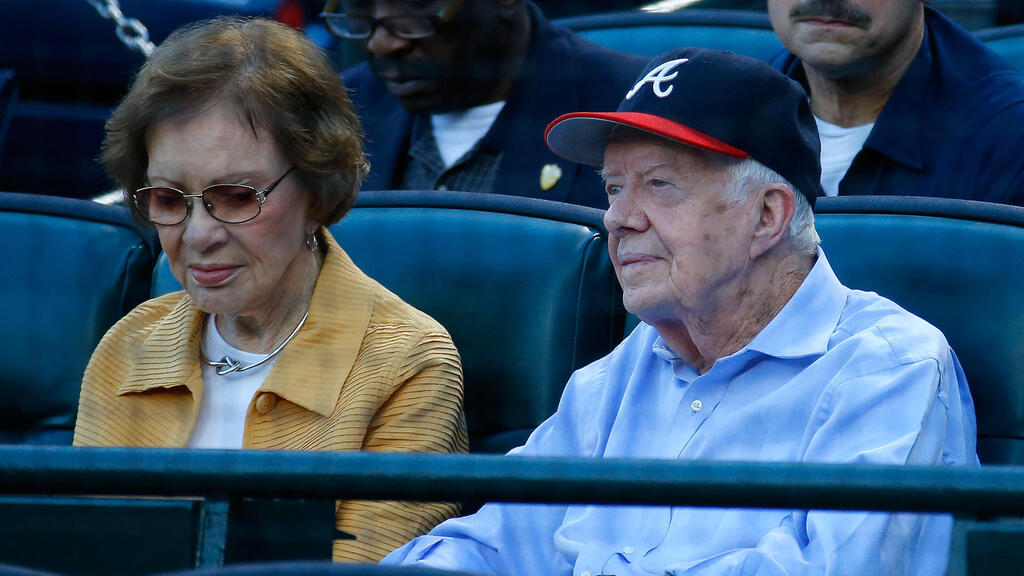Getting your Trinity Audio player ready...
Jimmy Carter, the 39th president of the United States, who played a pivotal role in brokering the historic Camp David Accords between Israel and Egypt, has died at the age of 100, the Atlanta Journal-Constitution first reported. He died Sunday at his home in Plains Georgia.
Carter, who lived longer than any other U.S. president, entered home hospice care in February 2023.
Carter's presidency, which spanned from 1977 to 1981, was marked by challenges both domestic and international, but his most enduring foreign policy legacy may well be his relentless efforts to broker peace in the Middle East.
10 View gallery


Egyptian President Anwar Sadat, US President Jimmy Carter and Israeli Prime Minister Menachem Begin at the signing of the Camp David Accords, 1978
(Photo: David Rubinger)
In 1978, Carter invited Egyptian President Anwar Sadat and Israeli Prime Minister Menachem Begin to the Camp David presidential retreat, resulting in thirteen days of intense negotiations. The outcome, the Camp David Accords, paved the way for the 1979 Egypt-Israel Peace Treaty, marking the first time an Arab country officially recognized Israel and making Egypt the first Arab nation to sign a peace deal with the Jewish state.
However, Carter's relationship with Israel and its leadership was, at times, strained. He pressured Israel for territorial concessions in the West Bank and Gaza and emphasized the rights of Palestinians, a stance that sometimes put him at odds with Israeli leaders and some segments of the American Jewish community.
10 View gallery


Carter embraces Begin as the Israeli leader arrives at Camp David
(Photo: David Rubinger)
10 View gallery


Saadat and Begin shake hands as they arrive at Camp David with Carter onlooking
(Photo: AFP)
After leaving office, Carter's engagement with Middle Eastern affairs did not wane. In 2006, he published Palestine: Peace Not Apartheid, a controversial book that criticized Israeli policies in the West Bank and the Gaza Strip and suggested that Israel's actions resembled aspects of apartheid. The book drew sharp criticism from Jewish groups, Israel supporters and several Carter Center advisers.
Get the Ynetnews app on your smartphone: Google Play: https://bit.ly/4eJ37pE | Apple App Store: https://bit.ly/3ZL7iNv
Despite controversies, Carter remained committed to peace in the region, emphasizing dialogue and mutual understanding. He made several trips to the Middle East in his post-presidential years, meeting with leaders, activists and ordinary citizens, advocating for human rights and peace.
Outside the Middle East, Carter left an extensive legacy of humanitarian work, most notably through the Carter Center, which has worked to eradicate diseases, monitor elections and promote peace worldwide.
Carter was born on October 1, 1924, in the town of Plains in rural south Georgia, between World War I and the Great Depression. As an adult, during World War II, he joined the U.S. Naval Academy, and served as an officer during the Cold War. In 1946, he married Rosalyn, also a native of Plains, and they had four children. After the death of his father, Earl, in the 1950s, the Carters returned with their young family to Plains, and he began managing the peanut farming business his father had left behind.
Carter was a moderate Democrat who quickly climbed the political ladder: from a local school board in the early 1960s, he made his way to the Georgia Senate, and from there he went on to become governor in 1971. He began his run for the White House in 1976 as an underdog, armed with a broad smile, openly Baptist customs, and programs that reflected his education as an engineer.
Carter won the hearts of many Americans thanks to his promise not to deceive the public after the disgraceful resignation of Nixon and the Vietnam defeat. "If I ever lie to you, if I ever make a misleading statement to you - don't vote for me," he said often during the campaign. "I will not be worthy to be your president."
Carter, who matured politically during the civil rights movement, was the last Democratic candidate to succeed in sweeping the Deep South of the United States, and in subsequent election campaigns, this region voted en masse for Reagan and the Republican candidates who followed him.
In the domestic arena of his presidency, Carter removed barriers in the airline and railroad industries, established the Federal Emergency Management Agency, and appointed a record number – for those days – of women and people of color to federal positions. Although he did not get to nominate a candidate for the Supreme Court, Carter managed to promote then-civil rights activist Ruth Bader Ginsburg to the second highest court, thus shortening her path to being appointed to the Supreme Court in 1993, a position in which she became one of the most prominent figures of the 21st century.
In the face of these achievements, many will remember Carter for the failures of his presidency, which ultimately led him to lose the presidency after one term - an event that was repeated only twice in the 40 years that followed (under Presidents George H.W. Bush and Donald Trump ). During Carter's time, the United States suffered from an oil crisis that caused double-digit inflation and rising unemployment, and dealt with the hostage crisis in Iran that lasted 444 days. The darkest moment for Carter was in April 1980, when eight American soldiers were killed in the crash of two helicopters during an attempt to rescue the hostages. Many in the American public believed that Carter was not taking a tough enough hand against Iran, and the failure of the operation exacerbated his decline in the polls.
In the years following his defeat in the 1980 election, Carter distanced himself from politics, and Democrats were wary of his approach. Republicans, for their part, turned him into a mocking punching bag, portraying him as a failed liberal. In fact, many commentators describe Carter as governing as a technocrat: on the one hand, he was more progressive than he had promised in his campaign on issues of race and gender equality, but on the other hand, he was a hawk on the economy and often angered liberal Democrats. One such Democrat was Senator Ted Kennedy , who ran against him in the 1980 primary and fought a battle that was very damaging to Carter.
After his defeat by Reagan in the 1980 election, Carter dedicated his life to promoting democracy, public health, and human rights and he did so through the Carter Center, which his wife Rosalynn founded in 1982. For this activity, he won the Nobel Peace Prize in 2002.
In his work for democracy, Carter was a pioneer in the field of election observers, and since 1989 his organization has monitored at least 113 elections in Africa, Latin America, and Asia to ensure their fairness. In the field of public health, one of his most famous projects was the fight against Guinea worm, through campaigns to improve access to safe drinking water in Africa. These efforts bore fruit, and if in 1986, when the Carter Center began leading the international effort to eradicate the disease, 3.5 million people were infected with it, in 2021 only 14 cases of Guinea worm were detected in humans.
Carter also continued to be involved in the diplomatic arena, and among other things, he helped to formulate a cease-fire agreement in Bosnia, an agreement that paved the way for a permanent settlement. In the Middle East, meanwhile, he became a harsh critic of Israel, and in the 2000s he often criticized its policies and expressed sympathy for the Palestinians. Among other things, Carter accused the government in Jerusalem of violating the understandings reached around the negotiating table, called for limiting Israel's use of American weapons, and in his book "Palestine - Peace, Not Apartheid" he accused Israel of hindering the peace process through settlements and claimed that this policy would lead to apartheid.
Carter was also one of the leaders of the movement to train Hamas: In 2006 he called on the world to give the organization a "chance " and in 2009 he made a well-publicized visit to Gaza, after the terrorist movement took over the country in a brutal coup. In 2014, during Operation Protective Edge, Carter called on the American government to remove Hamas from the list of terrorist organizations and recognize it as a political actor. At the time, Carter sharply criticized Israel's conduct in the operation, claiming that there was no human or legal justification for the way the IDF conducted itself. At the time, he accused Israel - like Hamas - of deliberate attacks against civilians.
Even in his 80s and 90s, Carter often went on long trips, including abroad, as part of his Carter Center activities, but in the last decade, his tenth decade, it is clear that he has been reducing his activities. The coronavirus pandemic had a major impact in this context, forcing him to limit public appearances and, among other things, avoid his regular lectures at the Baptist church in Georgia, where he used to speak for decades.
Over the past decade, Carter has also battled a host of health problems, including a cancerous tumor removed from his liver and metastases discovered in his brain. Against all odds, he recovered from the cancer at the age of 91, after receiving experimental treatment.
Rosalynn Carter, Jimmy Carter’s wife of 77 years, died in November 2023. He is survived by his chidren - Amy, Chip, Jack and Jeff; 11 grandchildren; and 14 great-grandchildren.


